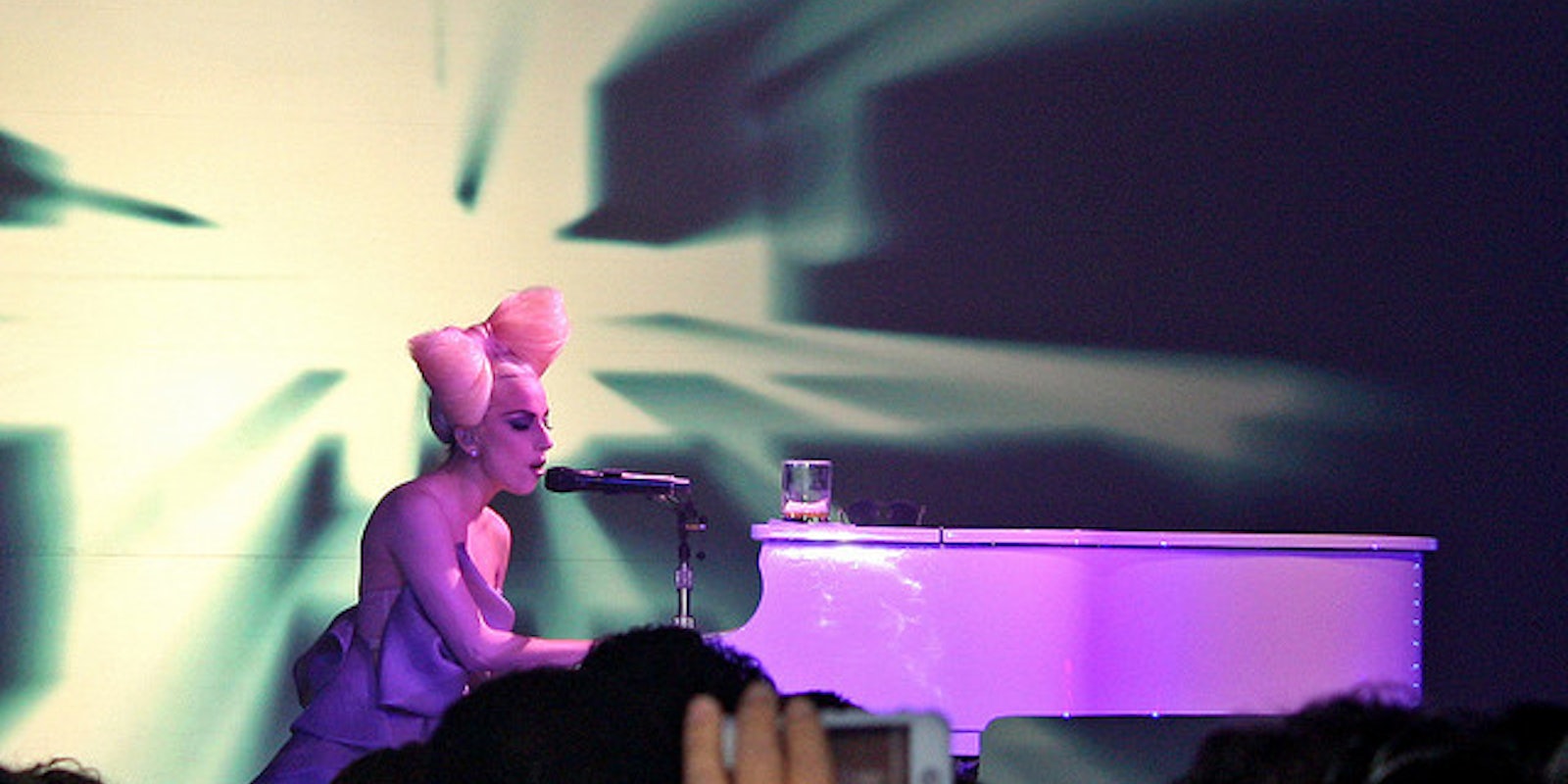By BEN BRANSTETTER
In 1994, a singer-songwriter with not even a record contract to her name became a number one artist. LIsa Loeb’s single “Stay (I Missed You)” became massively ubiquitous—peaking at the top spot of the Billboard Hot 100, largely due to its inclusion in the Ben Stiller film Reality Bites. Stiller came in contact with the track through actor Ethan Hawke, with whom Lisa Loeb was good friends. (She had passed a demo tape of the song to him, and Hawke gave it to Stiller.)
As the melodrama of that film ended, few songs could have been as perfect an emblem of Generation X’s angst as Lisa Loeb’s ballad. Not only because of its sweetly rebellious tone, but because of its deeply independent nature: At the time, it was the first and only song to top the Billboard charts without a record label behind it.
Loeb was joined in this honor just this year by Seattle rapper Macklemore, and his producer Ryan Lewis. While Macklemore’s 2012 album The Heist is mostly filled with niche, socially conscious rap (the pro-gay marriage ballad “Same Love”), the all-too-silly track ‘Thrift Shop” has become a massive hit, topping the Billboard charts due to a viral nature specific to the Internet age.
 Though Macklemore and Lisa Loeb’s breakout singles could not be more different, both owe their popularity to an enormous groundswell of fan support and discovery. But times have changed. While Loeb had to rely on good old fashion networking to accomplish her fame, Macklemore’s success is largely due to Facebook likes and Spotify charts.
Though Macklemore and Lisa Loeb’s breakout singles could not be more different, both owe their popularity to an enormous groundswell of fan support and discovery. But times have changed. While Loeb had to rely on good old fashion networking to accomplish her fame, Macklemore’s success is largely due to Facebook likes and Spotify charts.
The Internet’s ability to create a star that has been written about a thousandfold before me, but there is one little-analyzed aspect to online fame. Macklemore had already gained a solid degree of attention before “Thrift Shop,” mostly due to the contrast of his political lyrics against the likes of Pitbull or Kanye West. It was during this period that Macklemore held residence in the new middle class of fame that only the Internet can provide.
Since the advent of television, there has been largely two levels of success in pop culture: total obscurity or total fame. Either you’re a small band touring in a borrowed van, or you’re flying in jets, taking all kinds of pills that give you all kinds of thrills. The Internet, however, has provided a solid middle ground for a wide variety of artists to rest their laurels to a group of devoted fans and still make something of a career.
This is largely due to the democratization of popularity. While the entertainment industry has spent the half of a century building fortresses around their studios, it’s only in the last decade that they’ve woken up to the fact that this swirling ether of media can grant a heck of a lot of folks with low-level studio contacts the careers they’ve dreamed of. There is no more absolute obscurity or absolute fame. There’s a Kinsey spectrum of fame, and a whole lot more folks who are happily perched between 3 and 7.
We’ve all seen the Internet’s ability to sustain a performance artist.
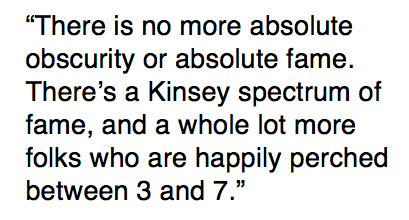 Louis CK made several million dollars selling his comedy special, Live At The Beacon Theater, solely through his website. Musical acts ranging from Radiohead to Nine Inch Nails have abandoned the classic label model and sold albums through pay-what-you-want schemes, all while reaping massive profits. Girl Talk—otherwise known as mashup artist Greg Gillis—would barely be possible without Internet distribution due to the very nature of his work (which relies on the most liberal reading of the Fair Use Act known to man).
Louis CK made several million dollars selling his comedy special, Live At The Beacon Theater, solely through his website. Musical acts ranging from Radiohead to Nine Inch Nails have abandoned the classic label model and sold albums through pay-what-you-want schemes, all while reaping massive profits. Girl Talk—otherwise known as mashup artist Greg Gillis—would barely be possible without Internet distribution due to the very nature of his work (which relies on the most liberal reading of the Fair Use Act known to man).
However, attend any party outside of hipster metropolises Brooklyn or Austin and you’ll be hard-pressed to find a devoted fan of Amanda Palmer or shows like Community. Community is being barely sustained by the ratings-hungry NBC (put out to pasture on the same time slot as The Big Bang Theory and American Idol) even though the show has a gargantuan presence and following online. The former creator of Community Dan Harmon is finding an arguably more productive role after his dismissal from the show last year. Harmon has successfully moved from one end of the spectrum (head writer of a network sitcom) to a new, Internet-created level directly below it: frequent podcast guest and prolific interview subject. Had this been 1994, Harmon would have been tossed around from writing panel to writing panel before eventually writing ads for Cheerios.
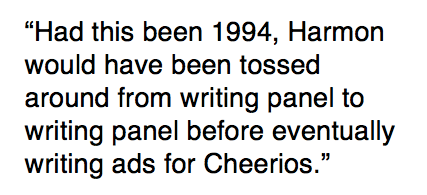 The other artist I mentioned, Amanda Palmer, had a solid record of indie success as half the goth-cabaret duo The Dresden Dolls. To fund her first solo album, Amanda Palmer created a Kickstarter fund which asked for a measly $100,000. At the close of the fundraiser, Palmer had gathered $1.2 million. To her fans and the readers of online music blogs, Palmer is a superstar to her fans. However, she is barely known to the populace at large (unless they come across her truly awful attempts at being poignant).
The other artist I mentioned, Amanda Palmer, had a solid record of indie success as half the goth-cabaret duo The Dresden Dolls. To fund her first solo album, Amanda Palmer created a Kickstarter fund which asked for a measly $100,000. At the close of the fundraiser, Palmer had gathered $1.2 million. To her fans and the readers of online music blogs, Palmer is a superstar to her fans. However, she is barely known to the populace at large (unless they come across her truly awful attempts at being poignant).
The Internet has saved and made artists like Harmon and Palmer by being both a safety net and a staircase, one that is becoming significantly easier to climb. Last year, Billboard changed the manner they track songs on their famous Hot 100 chart by including online streams and Youtube views. This allows “online sensations” to become real world pop stars. This move does have it’s detractors, however—a change.org petition claims the new metrics will encourage artists and labels to record crossover hits instead of genre-specific tracks.
However, this nature of success does come with a litany of dangers. First, the Internet has a notoriously short attention span. Whether we’d like to admit it now or not, Macklemore is destined to become a fascination of 2013 nostalgia pieces—a danger PSY faces as well and mostly for the same reasons. This is not an especially new feature in pop culture, but the speed with which the Internet moves on to the next thing is often in stark contrast to the fact I can still hear The Cardigans on soft-rock radio.
Second, let’s not get confused here: this is the middle class of fame. We’re not talking Mumford and Sons or Taylor Swift. What happens when these beneficiaries of online obsessions start assuming they are actually superstars? The Internet—as wide open as we assume it to be—develops cliques and subcultures which consistently shut each other out. How does an artist grow as a business if you fail to reach out to potential fans? The general Internet user does not do too much “online tourism.” They check in on the sites they like and don’t go much further than that. 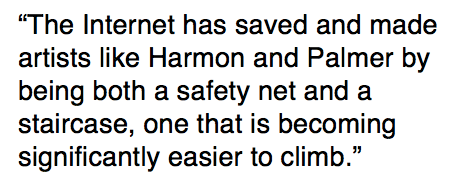
There’s currently a race to avoid being a destination on the Internet and instead become the driver. Just take a look at Facebook’s latest redesign>, built around an effort to be the largest driver of traffic it possibly can. The Drudge Report, led as it is by conservative news aggregator Matt Drudge, has built a massively successful business model on this concept. The same is true of Facebook, Stumbleupon, Twitter, Pinterest, and Reddit (this is why users only receive “karma” for links). But all these sites also aim to craft as personalized an experience as possible. This forces each of us as individuals into smaller and smaller culture bubbles, our heads filled with only the voices we choose to hear.
If you wish to make a living in any business, a lack of growth leads to death. Youtube’s pay scale, for example, benefits those who sustain and grow their popularity over time. After your account’s first million views, Youtube gives you a third of a cent ($0.0033) for every subsequent view, meaning you receive $3,300 for every subsequent million views Lovelyish has a fantastic breakdown of how this works and know you must be a Youtube Partner). This means someone like Rebecca Black has earned over $20,000 on Youtube alone, yet it fails to reach what she made in digital downloads during the peak of “Friday”, coming in at $24,000 per week. Still, it doesn’t quite raise her to earnings of someone like Jay-Z who pulled $38 million last year (and perhaps we can be thankful for that). Billboard put it best when they reported on Black: “Not Bad, But Not In The Millions.”
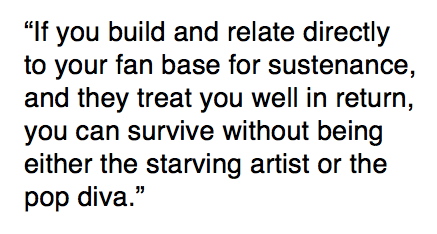 This is where this new middle class of the Internet can thrive. Many artists are discovering the advantages of being a step or two below superstar. If you build and relate directly to your fan base for sustenance, and they treat you well in return, you can survive without being either the starving artist or the pop diva. Without having any producers or managers try to change your artistic identity. Without having to pay them. Without, potentially, having to confront old media at all.
This is where this new middle class of the Internet can thrive. Many artists are discovering the advantages of being a step or two below superstar. If you build and relate directly to your fan base for sustenance, and they treat you well in return, you can survive without being either the starving artist or the pop diva. Without having any producers or managers try to change your artistic identity. Without having to pay them. Without, potentially, having to confront old media at all.
The Internet is not merely its own culture; it is also its own economy. From ad-sharing schemes to Kickstarter to the Internet consistently supports its own artistic community. And while someone like Macklemore is probably immensely happy to be appearing on SNL> and Late Night With Jimmy Fallon, and perhaps may be nearing his 15 minutes of “absolute” fame, there are thousands if not millions more artists (from Karmin> to Epic Meal Time to Cyanide & Happiness) delighted to see a devoted group of nerds holding them from obscurity.
Macklemore is still unsigned—”Trust me/On my I-N-D-E-P-E-N-D-E-N-T shit hustler,” he reassures us on latest single—and has likely turned down any number of record contracts, perhaps reveling in the possibilities when one creates their own wealth. And just one Internet level below that, there are communes of artists and fans carrying each other on smaller waves of achievement to the comfortably adequate shore of an artist surviving, but not thriving, on their work.
Ben Branstetter is a writer and blogger living in Central PA. He attended the Milton Hershey School and studied Secondary Education at Penn State University. His work has been published in Thought Catalog, The Useless Critic, God of Lamb, and he has appeared on HuffPo Live. He can be reached by email at branstetterb@gmail.com and found on Twitter @BenBranstetter.
Photo by MediaPost Communications/Flickr

